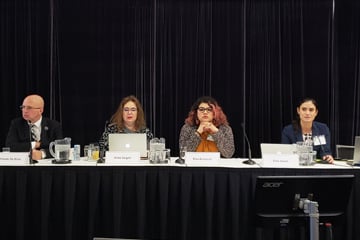
While studies have shown that lawyers disproportionately face mental illness more so compared to other professions, racialized lawyers often face additional challenges in this regard, according to a panel of lawyers speaking yesterday at the Roundtable of Diversity Association’s fourth annual conference in partnership with the Ontario Bar Association.

While studies have shown that lawyers disproportionately face mental illness more so compared to other professions, racialized lawyers often face additional challenges in this regard, according to a panel of lawyers speaking yesterday at the Roundtable of Diversity Association’s fourth annual conference in partnership with the Ontario Bar Association.
Racialized lawyers face a unique set of mental health hurdles due to intergenerational trauma — traumatic experiences and oppression passed down historically through their relatives. However, the legal profession has recently started to open up a dialogue for mental health, slowly reducing the taboo nature of mental illness.
"Depression is an illness, not a weakness," said Orlando Da Silva, senior Crown counsel with the serious fraud office, prosecution division, part of the Ministry of the Attorney General’s office in Ontario.
Law student Elsa Ascencio said that in her years of studying law, she recognized that being racialized doesn’t just mean coming from a different culture or speaking your mother tongue, but it also means repeatedly hearing about the trauma faced by people of your culture and your family. This has shaped the way she learned to cope with stress throughout her life, especially in law school.
“My mom saw beheadings; she saw the murder of her brother and the disappearance of my other uncle. Imagine carrying that weight and you knew growing up that something happened to your parents, but they didn’t talk about it,” she said, having parents who were refugees who fled the Salvadoran Civil War. “Growing up, essentially, you learn coping mechanisms from your parents.”
Anita Szigeti, sole practitioner at Anita Szigeti Advocates and president of the Law and Mental Disorder Association, is the daughter of Holocaust survivors. She shared similar experiences, stressing the importance of receiving support to overcome intergenerational trauma and mental illness.
Moderator Dina Awad, vice chairwoman of RODA, said that during her undergraduate years studying psychology, she wrote her final paper on the intergenerational trauma of Holocaust survivors. She said research shows that experiencing severe trauma actually affects the DNA of people at the molecular level and could be “transmitted” to offspring.
Panelists also opened up about their experiences surviving suicide attempts and personal struggles with mental illness, coping with it through law school and throughout their legal careers.
“I have learned that the strongest people I’ve ever known are those who have suffered from depression and anxiety, partly because they live every day doing what they do, like Sisyphus pushing the boulder up the mountain, knowing if they relax, it’ll roll over them,” said Da Silva.
Law is an already stressful profession, with additional pressures to pay back hefty law school loans, billing a wealth of working hours and achieving success, so it’s not uncommon for lawyers to lack a work-life balance, which deteriorates mental well-being.
A second-year associate was recently honoured, and received a standing ovation, at a gala for billing 600 hours during the month of August, said Da Silva. He and the panel unanimously agreed that this frightening behaviour shouldn’t be rewarded because it isn’t healthy. Yet, overworking and negative “what-if” thinking models are not only normalized but they are applauded in the profession.
The panel members agreed that having support and sharing personal lived experiences with others is one of the best ways to deal with mental illness and stress within the legal profession and in general.
“If we can all feel that the profession has become a safe place to share that experience, then we’ll have come a huge way along in making this a more compassionate profession, and one where we can feel safe seeking treatment, talking to people about how we are doing and getting help,” Da Silva said.
Dealing with obsessive compulsive disorder, depression and anxiety hasn’t stopped Ascencio from achieving her dream of being a lawyer. The reality is that it has made her a better lawyer because she’s resilient, has learned how to cope and better understands her strengths and weaknesses, she said.
Law societies in Canada often provide services for lawyers to get the mental health help they need. The Law Society of Ontario, for instance, has the Member Assistance Program, offering counselling and other services to members of the bar in need.